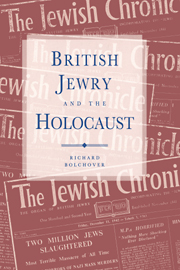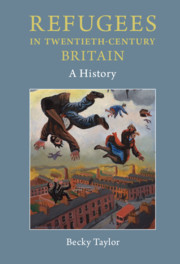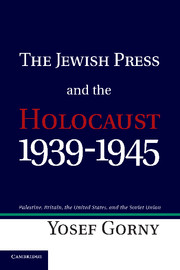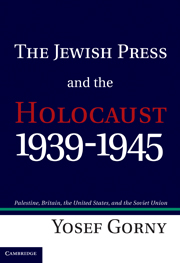Whitehall and the Jews, 1933–1948
Whitehall and the Jews is the most comprehensive study to date of the British response to the plight of European Jewry under Nazism. It contains the definitive account of immigration controls on the admission of refugee Jews, and reveals the doubts and dissent that lay behind British policy. British self-interest consistently limited humanitarian aid to Jews. Refuge was severely restricted during the Holocaust, and little attempt made to save lives, although individual intervention did prompt some admissions on a purely humanitarian basis. After the war, the British government delayed announcing whether refugees would obtain permanent residence, reflecting the government's aim of avoiding long-term responsibility for large numbers of homeless Jews. The balance of state self-interest against humanitarian concern in refugee policy is an abiding theme of Whitehall and the Jews, one of the most important contributions to the understanding of the Holocaust and Britain yet published.
- The first detailed account of British immigration policy towards refugee Jews
- The author's unique mixture of historical and legal expertise, and her personal commitment (as the daughter of Jewish refugees), gives the book exceptional authority
- Throws new light on the role of civil servants in shaping policy
Reviews & endorsements
"... a comprehensive account of the British response to the plight of Europe's victims of Nazism..." Physics Today
"With encyclopedic knowledge and utter precision Louise London has given us the most detailed account of British policy toward Jewish refugees and escapees from Nazi domination." Raul Hillberg, Emeritus, University of Vermont
"How did Britain respond to the desperate plight of Jews persecuted by the Nazis before, during and after the Second World War? The most thorough and detailed study of this question to date, Louise London's Whitehall and the Jews is remarkably balanced and authoritative. True, the British response was highly inadequate--particularly when examined in light of the Nazi's ferocity and our own standards of humanitarianism. But the author of this remarkable book strives to explain, rather than denounce: she shows officialdom's diversity of response; she uncovers significant generosity; and she explains why, for governments at the time, Jewish suffering was not assigned a higher priority. The great contribution of this work is to present the Jewish issue in its rich historical context--a goal of every historian, but one that is seldom realized with the skill, insight and sensitivity displayed here." Michael R. Marrus, University of Toronto
"Whitehall and the Jews is an impressive piece of work of great scholarly value....Its conclusions are carefully drawn and compelling." Professor Vernon Bogdanor, Brasenose College, Oxford
"Intended as a comprehensive study of the British response to the plight of European Jewry under Nazism, in particular the immigration controls on admission of Jews to the United Kingdom and the doubts and dissent behind British policy." Reference & Research Book News
"...students of refugee and immigration policy will be indebted to London for producing perhaps the most comprehensive book on British refugee policy during the Holocaust to date." International Migration Review
"Louise London's book should be compulsory reading in Whitehall today." David Cesarani, Times Literary Supplement
This is the most complete, to date, study of the British response to European Jewry under the Nazis, and the first detailed account of British immigration policy toward refugee Jews." Jack Fischel, Indiana Jewish Post & Opinion
"This does not make for dull reading. It is at its most interesting when examining the identity and the intellectual, political, and emotional arguments of the small group of officials." The International History Review Dec 2001
"...authoritative...she has tackled a sensitive and unpopular subject with objectivity and skill, making this a work of seminal significance...London must be congratulated for her exemplary use of unpublished material, especially of official documents. Her persistent research into public archives has resulted in a penetrating and unrivalled insight into the workings of the British government." The Jewish Quarterly Review
Product details
February 2003Paperback
9780521534499
332 pages
229 × 153 × 23 mm
0.5kg
10 b/w illus.
Available
Table of Contents
- Introduction
- 2. Immigration control
- 3. Control without visas
- 4. New restrictions after the Anschluss, March to October 1938
- 5. From Kristallnacht to the outbreak of war, November 1938 to September 1939
- 6. Refugees from Czechoslovakia
- 7. War-time policy
- 8. The response to the Holocaust
- 9. Post-war decisions
- 10. Conclusion.









.jpg)
.jpg)